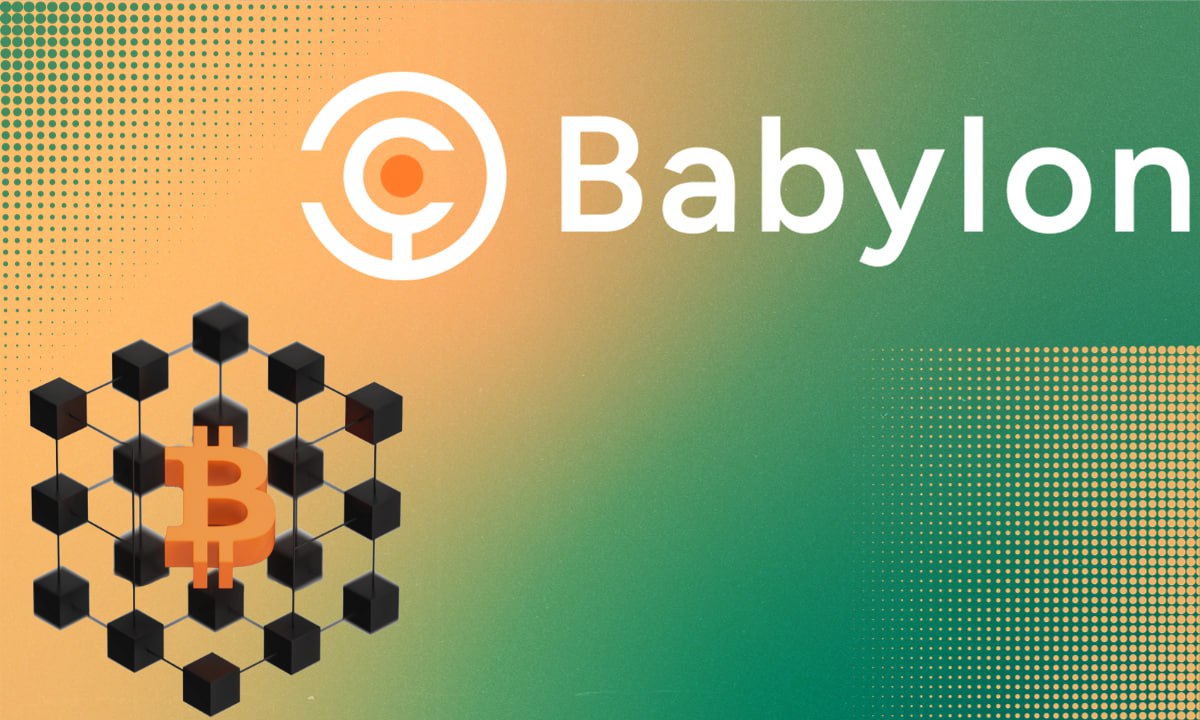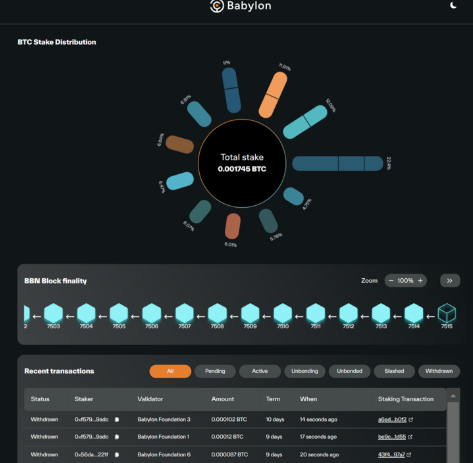–News Direct–

Babylon, the blockchain project that aims to convert the 21 million bitcoins into a decentralized staking asset for the Proof of Stake economy, unveils its Bitcoin Staking Protocol MVP at the Cosmoverse 2023. Earlier this year, Babylon published a litepaper outlining its pioneering concept of native trustless Bitcoin staking to secure PoS chains. Recent data from Glassnodes reinforces the pressing need for such an innovation. A staggering 66% of Bitcoins circulating supply, equivalent to 12.26 million BTC, remained dormant for a year. This indicates vast untapped potential, positioning idle Bitcoins to boost the economic security of PoS chains and decentralized applications (dApps) that rely on staking.
Babylon positions itself as the first marketplace to connect the $500B decentralized trust to earn yield for providing security capital. The company was able to gain support from prominent Cosmos chains that are exploring to adopt Babylons Bitcoin Staking Protocol. Zaki Manian, co-founder of Sommelier Protocol, said, For years interactions between bitcoin and the growing web3 application layer have been limited to bridging and swapping. Babylon Bitcoin staking lays the path for consensus layer integration with modular and app chains.
PoS chains have historically been tethered to their native assets for security. However, as the majority of capital gravitates to established protocols, emerging chains often grapple with limited staked resources, undermining their security. In addition, to attract staking, chains usually have to implement very high inflation to pay for high staking rewards, which affects its token utility and economic health. This has resulted in a fragmented ecosystem where networks are forced to compete for a limited pool of staked capital. Babylons Bitcoin Staking Protocol provides a way for PoS chains to stake Bitcoin instead of their native tokens. This allows PoS chains to acquire staking capital from the largest crypto asset in the world and enjoy high security. In addition, since Bitcoin has been serving as a store of value without much yield, using Bitcoin as a staking asset can greatly reduce PoS chains inflation pressure.
"Babylon's protocol doesn't just harness these idle bitcoins, it transforms them into a security backbone for PoS chains," said David Tse, Co-founder, Babylon. "Our approach seamlessly integrates Bitcoin staking with almost any PoS protocols in a modular fashion, allowing any bitcoin holder to earn staking rewards from a wide variety of PoS chains. This not only amplifies economic incentives but paves the way for broader adoption, underscoring Bitcoin's diverse utility beyond its widely-recognized role as a store of value."
Babylon overcomes the limitations of Bitcoins scripting language by amalgamating it with advanced cryptographic techniques. It allows bitcoin holders to lock their bitcoins on the Bitcoin network in a self-custodian way, yet the locked bitcoins can serve as a first-class staking asset for PoS chains with desirable properties such as yield-generation, slashability, and on-demand unstaking. In addition, Babylon's Bitcoin staking protocol does not require any soft or hard fork of Bitcoin.


Babylon MVP showcases the first implementation of this new technology, where bitcoin testnet coins are staked to secure Babylon PoS chain, which will serve as the control plane for other PoS chains to access to the Bitcoin staking protocol. The MVP comes with a modern explorer and a very straightforward web application for bitcoin holders to test Bitcoin staking.
After the MVP debut, Babylon will focus on adoption in various ecosystems. This includes the Cosmos ecosystem of blockchains, which is heavily reliant on native staking. Within Cosmos, the top ten protocols boast a combined $2.5 billion worth of staked assets, with an average staking ratio of 50%. Furthermore, 34 integrated PoS chains have shown a strong desire to reduce the 21 day unbonding time for assets staked in Cosmos. Demand for Babylons time-stamping protocol was made clear when the Osmosis governance proposal to utilize Bitcoin staking was passed with a 99.9% vote in favor.
The Company successfully secured a seed funding round, spearheaded by IDG and Breyer Capitalprominent early backers of Coinbase and Circle. With this momentum, the firm is actively seeking additional investment to bolster the advancement of the Bitcoin Staking protocol, among other initiatives.
About Babylon
Babylon is a blockchain project that designs security protocols for the decentralized world. Babylons origins come from a transformative research paper on Bitcoin security co-authored by Babylon co-founders David Tse, a professor at Stanford, Fisher Yu, Sreeram Kannan, the founder of EigenLayer, and co-authors. This Bitcoin security research paper achieved a significant milestone as it has been accepted by the 2023 IEEE Symposium on Security and Privacy, recognized as the world's leading security conference. The project is led by a team of consensus protocol researchers from Stanford and experienced layer 1 engineers from around the world.
Babylon's mission is to scale Bitcoin to secure the decentralized world. To achieve this, Babylon utilizes the three primary facets of Bitcoin: Bitcoin as an asset, its reliable timestamping service, its most censorship-resistant blockspace in the world. To leverage these facets, Babylon is developing three innovative security-sharing protocols: Bitcoin Staking Protocol, Bitcoin Timestamping Protocol, and Bitcoin Data Availability Protocol. Through these pioneering protocols, Babylon envisions a more secure and decentralized future.
Bitcoin Staking Protocol MVP: https://btcstakingscan.devnet.babylonchain.io/
Contact Details
Babylon
Shalini Wood, CMO
View source version on newsdirect.com: https://newsdirect.com/news/babylon-positions-bitcoin-beyond-store-of-value-unveiling-its-bitcoin-staking-protocol-mvp-at-cosmoverse-2023-586215540
Babylon
COMTEX_441298804/2655/2023-10-02T07:46:29
Disclaimer: The views, suggestions, and opinions expressed here are the sole responsibility of the experts. No Open Headline journalist was involved in the writing and production of this article.
